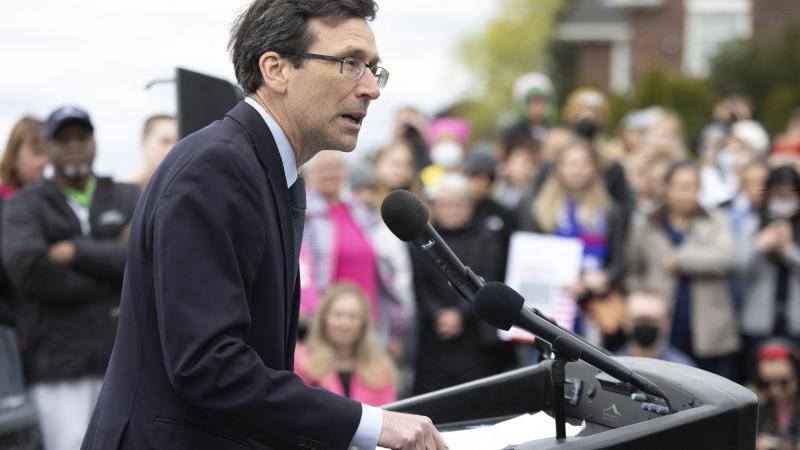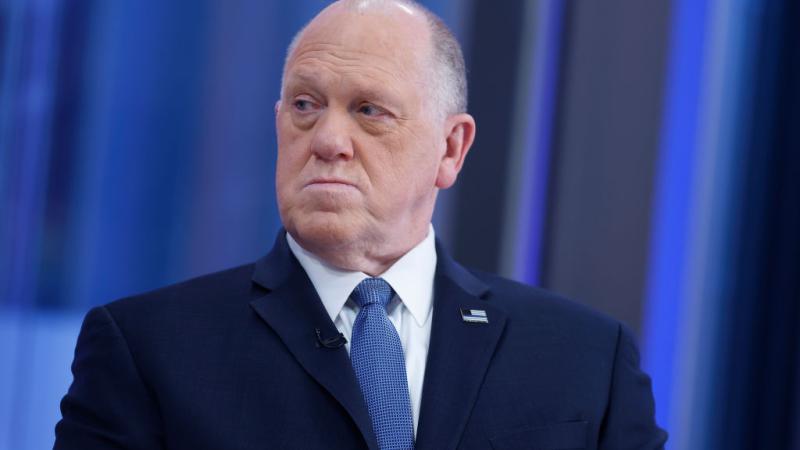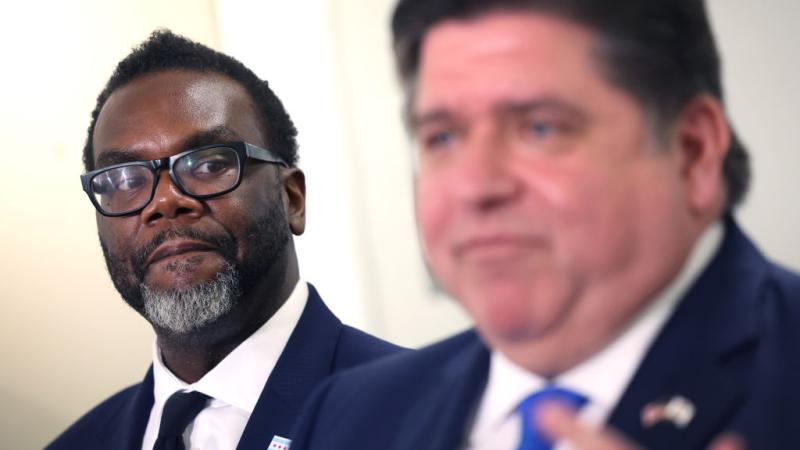Kristi Noem sees 2024 prospects falter amid blowback over transgender sports bill
Contentious LGBT sports debate comes to a head in South Dakota.
South Dakota Gov. Kristi Noem, a rising superstar whose defiant response to COVID-19 made her an early contender for the 2024 Republican presidential nomination, is facing sudden turbulence as she holds off signing a controversial transgender sports bill passed by the South Dakota legislature.
Noem, among just a few state governors who refused to lock down her state and/or issue a statewide mask mandate over the past year, has received major conservative blowback over the decision not to sign the legislation, which she claims is motivated by a pragmatic concern over the self-defeating legal and political fallout the bill might engender.
At issue is South Dakota House Bill 1217, which sought to draw clear lines between male and female sports leagues and prevent transgender athletes from choosing teams based on their own internal sense of identity. Critics have argued that young female athletes in particular would face significant disadvantages if they are forced to compete against opponents who identify as women yet retain competitively decisive male physical advantages.
The bill stipulates that, within public schools and higher education in the state, "a team or sport designated as being female is available only to participants who are female, based on their biological sex."
The legislation was passed by both the South Dakota house and senate and sent to Noem for her to sign into law. Noem, however, refused to sign it, claiming in a Twitter thread last week that the bill contained "vague and overly broad language [that] could have significant unintended consequences."
The governor claimed the bill would create an "unworkable administrative burden" on some schools, and that its approach was "unrealistic in the context of collegiate athletics," given the authority that collegiate athletics associations have over state-level conferences.
In her proposed changes to the bill, Noem asked that, among other changes, the higher education section of the bill be dropped, as well as a provision under which students would be required to swear they were not taking "performance-enhancing drugs."
"Overall, these style and form clarifications protect women sports while also showing empathy for youths struggling with what they understand to be their gender identity," Noem wrote.
Blowback follows governor's veto
Noem's decision generated significant pushback from conservative media and commentators, with many arguing that she was failing to protect the integrity of girls' sports in response to pressure from major corporations.
At National Review, that publication's editors wrote of what they called Noem's "disappointing capitulation," calling it "a classic case of a politician motivated by immediate financial incentives (in this case, avoiding expensive lawsuits and potential boycotts)."
Claiming Noem's proposed changes were "an attempt to pursue a middle road that simply does not exist," they wrote: "This is not difficult. Either boys should be allowed in girls' sports, or they should not."
Noem was also needled hard by conservative Fox News host Tucker Carlson in an interview earlier this week in which he dismissed Noem's fears that the bill could invite major retribution from the NCAA.
"This is thousands of years of common sense and tradition," Carlson said. "Girls play girls' sports, boys play boys' sports. Why not instead just say: Bring it on, NCAA?"
Noem in that interview called the original bill "a trial lawyer's dream" that would create "more and more litigation and regulation that's impossible to comply with for families and for school districts and people going forward." She pledged to keep working in the state to "protect girls' sports through K through 12" as well as "fight the NCAA through a coalition."
Though she is positioning herself for what may be a drawn-out fight against the push for transgender sport integration, Noem's approach to doing so may have dealt a significant blow to her 2024 prospects. The issue has became a major flashpoint in the U.S. culture war, with multiple Republican-led states recently passing legislation to affirm sex-segregated sporting leagues and major LGBT advocacy groups claiming that those efforts are the products of bigotry and intolerance.
Lane Koch, the founder of the strategy firm Grassroots Girl, said Noem's decision indicates that she "might need better consultants around her."
"Candidates often think they need to run more moderate in order to gain mass appeal on the national level," Koch said, "however in this case, it's a mistake. Gov. Noem's star rose in 2020 when she was the only governor in the union to allow businesses to remain open amidst the pandemic. Gov. Noem should run for president the same way she has led the state of South Dakota — strong and principled."
Matt Butler, a co-founder of the consulting firm EZPolitix, said that it's "a little premature" to speculate on the fallout the controversy may have, in part because "we don't know what Noem ultimately wants to run for."
Still, "no matter what she does, or when, this is going to come up," he said. "If she's looking at a Republican primary of some kind, whether it's for Senate or president, then she's going to have to deal with this.
"And Republican voters are going to look at it one of two ways. One way is that she did the pragmatic thing — she was out to keep the convention business, the sports events [in South Dakota]. On the other hand, in a primary, other Republicans are going say, 'She buckled. She has no spine. She didn't stand up for princples. She caved when somebody looked at her funny.'"
Spence Rogers, a Republican political consultant for Go Right Strategies, argued that Noem's decision not only likely hurt her chances in 2024 but may also draw a line in the sand for other Republican hopefuls as well.
"This absolutely hurts her chances," Rogers said, "and further, it puts pressure on possible contenders like Ron DeSantis who have not fought to stop men from playing on girls' sports teams yet. This issue will be a 2024 litmus test for conservatives."
That test may come soon enough for other Republican presidential aspirants. A similar bill is currently in play in the Florida House of Representatives. That state's governor, Ron DeSantis, has frequently been floated as a likely contender for the 2024 GOP nomination. DeSantis, like Noem, spent much of the last year bucking conventional orthodoxy on the pandemic.
A transgender sports bill is also working its way through the Texas legislature. Texas Gov. Greg Abbott has also been proposed as a possible contender for his party's 2024 presidential nomination.
Though such bills may indeed entail the kinds of legal clapbacks Noem claims to fear, the laws overall have broad support across the country.
Multiple polls indicate that much of the public is in favor of sports staying strictly segregated by sex. A Rasmussen Reports national poll from earlier this year found that 54% of U.S. adults would like sporting teams to remain separated by sex.
A recent Morning Consult/Politico poll found similar numbers among U.S. voters, with support among Republicans skyrocketing to 74%.
















